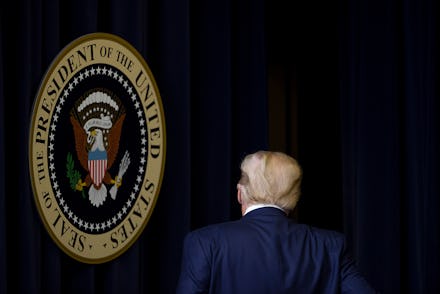Trump is trying to squeeze in five more federal executions before he leaves office

President Trump is an executive like no other. The 45th president ran for office on a campaign of derision, condemning the very office which he sought. And now, four years later, Trump is adding to his legacy in a Trumpian way: by speeding up federal executions.
There are fewer than 40 days between the changing of presidential administrations, which means that the executions of Brandon Bernard (who was set to be killed by government administration of lethal injection Thursday), Alfred Bourgeois, Lisa M. Montgomery, Cory Johnson, and Dustin Higgs, are rare for a number of reasons.
First, the federal government resumed executions this summer after a 17-year pause, executing multiple individuals in quick succession during a global pandemic. Robert Dunham, the director of the Death Penalty Information Center, told the Associated Press that it's also abnormal for the federal government to execute people during an administrative transition. In fact, it hasn't happened since the presidency of Grover Cleveland in the late 1800s.
Dunham told AP that Trump's favoring of the death penalty defies political decorum. "It’s hard to understand why anybody at this stage of a presidency feels compelled to kill this many people … especially when the American public voted for someone else to replace you and that person has said he opposes the death penalty," Dunham said. "This is a complete historical aberration."
Even though Trump's replacement, President-elect Joe Biden, has pledged to end the federal executions, the promise for now is an empty one. Biden doesn't have executive powers until his swearing in on Jan. 20, which means that until then, five lives are in the hands of Trump and Attorney General Bill Barr, including Bernard's.
Barr has long argued that the death penalty is not a political issue and that it is incumbent upon the Department of Justice to carry out its duties as outlined by federal law in the name of justice. But it's difficult to understand how the federal executions of five people, each of whom carry the legacies of a racist and sexist criminal-legal and sentencing system, are anything but political.
Moreover, the global coronavirus crisis has sidelined the lawyers responsible for defending some of the imprisoned individuals as well as staff at the federal prison. The Trump administration has gone out of its way to rewrite federal regulations to allow for execution by firing squad, amid a sociopolitical and economic catastrophe that will soon have killed 300,000 people.
There are five people awaiting their deaths in Terre Haute, Indiana, where all federal executions take place. Four are Black men, one is a white woman, and each are beholden to the Trump vision of justice for now. So what's the point of Trump's concluding push as his presidency wanes? As Adam Serwer wrote for The Atlantic, it's likely just to prove that he can. "Taking joy in that suffering is more human than most would like to admit," Serwer wrote. "Somewhere on the wide spectrum between adolescent teasing and the smiling white men in the lynching photographs are the Trump supporters whose community is built by rejoicing in the anguish of those they see as unlike them, who have found in their shared cruelty an answer to the loneliness and atomization of modern life."